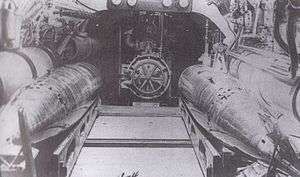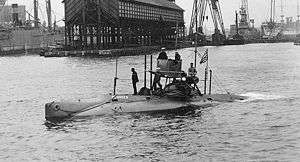Plunger-class submarine
| USS Plunger (SS-2) |
| Class overview |
| Builders: |
|
| Operators: |
 United States Navy United States Navy |
| Preceded by: |
USS Holland (SS-1) |
| Succeeded by: |
B-class submarine |
| Built: |
1900-1903 |
|
In commission: |
1903-1921 |
| Completed: |
7 |
| Retired: |
7 |
| Preserved: |
0 |
| General characteristics |
| Type: |
Submarine |
| Displacement: |
107 tons |
| Length: |
63 ft 10 in (19.46 m) |
| Beam: |
11 ft 11 in (3.63 m) |
| Draft: |
10 ft 7 in (3.23 m) |
| Propulsion: |
|
| Speed: |
- 8 knots (15 km/h; 9.2 mph) (surfaced)
- 7 knots (13 km/h; 8.1 mph) (submerged)
|
| Test depth: |
150 ft (46 m) |
| Complement: |
7 |
| Armament: |
One 18 in (457 mm) torpedo tube (3 long or 5 short torpedoes) |
The Plunger class was an early class of United States Navy submarines, used primarily as training and experimental vessels for the newly formed "silent service" to familiarize naval personnel with the performance and operations of such craft. They were known as the "A-class" after being renamed to A-type designations (A-1 through A-7) on 17 November 1911. All except Plunger ended up being stationed in the Philippines, an American possession, prior to the outbreak of World War I. They were shipped there on colliers (coal-carrying ships). In some instances, this class of submarines is referred to as the Adder-class submarine, as USS Adder was the first boat of the class to be completed.[1][2]
Design and construction
The Plunger-class submarines were built at the beginning of the twentieth century largely as experimental vessels. The prototype, named Fulton, was later sold to Russia, and renamed Som. The Plunger class was built at two different locations on both coasts of the United States.
Service
The five East Coast boats were based at New Suffolk, New York until 1905, allowing New Suffolk to claim itself as the first submarine base in the United States.[3] The squadron remained at New Suffolk until 1905 when it was moved to Newport, Rhode Island. The submarines of the Plunger class later were moved to the Philippine Islands where they served through the First World War.
The class was given alphanumeric hull classification symbols (SS-2, SS-3, etc.) on 17 July 1920, after all but Grampus (SS-4) and Pike (SS-6) had been decommissioned. All of the Plunger-class boats were decommissioned by 1921, and all except Plunger used as targets. They were stricken from the Naval Vessel Register on 16 January 1922 and sold for scrap.[1]
Boats

Plunger, Adder, Moccasin, Porpoise, and Shark.

A 1912 view of the breech of the sole
torpedo tube of USS
Moccasin /
A-4. Two
torpedoes are on wooden skids in the foreground. The skids slid across the deck for loading.
See also
References
Bibliography
- Bauer, K. Jack; Roberts, Stephen S. (1991). Register of Ships of the U.S. Navy, 1775-1990: Major Combatants. Westport, Connecticut: Greenwood Press. ISBN 0-313-26202-0.
- Friedman, Norman (1995). U.S. Submarines Through 1945: An Illustrated Design History. Annapolis, Maryland: Naval Institute Press. pp. 285–304. ISBN 1-55750-263-3.
- Gardiner, Robert; Gray, Randal (1985). Conway's All the World's Fighting Ships, 1906-1921. London: Conway Maritime Press. ISBN 0-85177-245-5.
- Silverstone, Paul H. (1970). U.S. Warships of World War I. London: Ian Allan. ISBN 0-71100-095-6.
- Navsource.org early submarines page
- This article incorporates text from the public domain Dictionary of American Naval Fighting Ships.
External links


.jpg)

.jpg)

.jpg)
.jpg)
